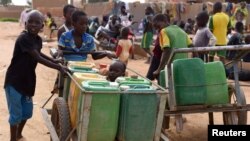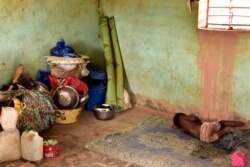The World Food Program warns that millions of people in Burkina Faso are facing what it calls an unprecedented humanitarian emergency because of growing hunger, instability and displacement.
Fighting in Burkina Faso has intensified over the past six months, raising intercommunal tensions. Attacks, killings and targeted kidnappings by different armed groups have increased.
The United Nations reports escalating fighting, some fueled by ethnic and religious beliefs, has forced more than 237,000 people to flee their homes. The insecurity and large-scale displacement, it says, has led to the closure of dozens of health centers and thousands of schools, depriving nearly 330,000 children of an education.
In addition, hundreds of thousands of people are facing severe food shortages. World Food Program spokesman, Herve Verhoosel, told VOA that hunger is particularly high during the so-called lean season. This, he explains, is the period between June and September when food stocks are particularly low before the next harvest.
"People have the problem to find food. Sometimes a problem of access. Then because of the security issues they cannot always access to markets or to go to work in the farms for example. That is why the combination of those two problems are giving the result that we have now. People are undernourished and we need support, and urgent support, in fact for food assistance," he said.
Verhoosel said WFP plans to scale up its humanitarian operation to assist nearly 700,000 people. He said the beneficiaries include 220,000 internally displaced people, the same number of people in the host communities and a quarter million people affected by food shortages during the current lean season.
He said special attention will be paid to the nutritional needs of IDPs, children, pregnant and breastfeeding women. He said they will receive nutritious food to prevent malnutrition and to treat those already suffering from this condition.
WFP is urgently appealing for $35.3 million to cover needs until the end of the year.





